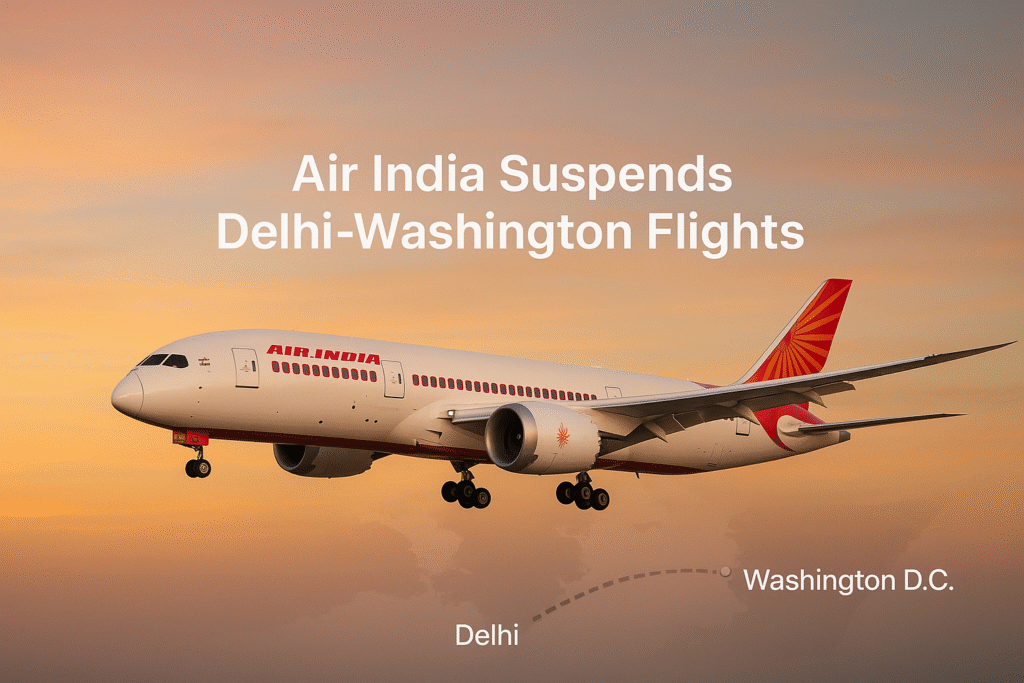The skies are changing for a key international route. Air India has announced the suspension of its non-stop flights between Delhi and Washington, D.C., effective from September 1, 2025. This significant change impacts a vital travel artery connecting the Indian capital with the U.S. capital. The airline has cited a combination of operational challenges, primarily a major fleet retrofit program and ongoing geopolitical constraints, as the reason for the decision. For thousands of travelers, this news raises important questions about flight rebooking, refunds, and alternative travel options. This in-depth article explores the reasons behind the suspension, the immediate and long-term implications for passengers, and the broader context of Air India’s transformation journey.
Table of Contents
A Deeper Look at Air India’s Decision
The move to suspend the Delhi-Washington D.C. route is not an isolated event but a consequence of several intertwined factors. Air India, now under the ownership of the Tata Group, is in the midst of a massive, multi-year transformation plan known as Vihaan.AI. Central to this plan is a comprehensive fleet upgrade designed to modernize the airline’s cabins and improve the overall passenger experience.
Fleet Retrofit: The Primary Cause of the Suspension
The most direct reason for the flight suspension is the airline’s ongoing cabin retrofit program. Air India has a fleet of 26 Boeing 787-8 Dreamliner aircraft that are undergoing an extensive upgrade. This program, which began in July 2025, involves:
- Installing new seats across Business Class, Premium Economy, and Economy cabins.
- Upgrading in-flight entertainment (IFE) systems.
- Replacing carpeting, curtains, and upholstery.
- Revitalizing galleys and lavatories.
This ambitious project is designed to bring Air India’s legacy fleet up to modern international standards. However, the process is time-consuming. The airline has stated that the retrofits will require several aircraft to be out of service for extended periods, creating a temporary but significant shortfall in its wide-body fleet. This makes it challenging to maintain all long-haul routes, and the Delhi-Washington service, which has been less frequent than some other U.S. routes, was deemed the most operationally complex to sustain during this period.
The Impact of Pakistani Airspace Closure
A secondary but crucial factor is the continued closure of Pakistani airspace to Indian carriers. This geopolitical constraint, which has been in effect since 2019, has forced Air India to reroute its flights to the U.S. and Europe, significantly increasing flight durations and operational costs.
- Longer Flight Paths: The Delhi-Washington non-stop route, which would typically pass through Pakistani airspace, has had to take a longer, more fuel-intensive route over the Arabian Sea and Europe.
- Increased Complexity: The longer flight times strain crew duty hours and aircraft utilization, making it difficult to operate a frequent, non-stop service with a reduced fleet.
- Operational Headaches: The combination of a longer route and a shortage of available aircraft due to the retrofit program made the Delhi-Washington route particularly vulnerable.
The airline’s official statement confirmed that the suspension is “primarily driven by the planned shortfall in Air India’s fleet,” but the “continued closure of airspace over Pakistan” also “impacts the airline’s long-haul operations.”
The Broader Context of Air India’s Transformation
This flight suspension is a calculated decision in the context of the larger Vihaan.AI plan, a five-year roadmap to transform Air India into a world-class airline. Since returning to the Tata Group in 2022, the airline has:
- Placed an historic order for 470 new aircraft from Airbus and Boeing.
- Unveiled a new brand identity and livery.
- Accelerated reliability upgrades and refined delay management processes.
The temporary suspension of a single route is seen by industry experts as a strategic move to ensure the reliability and integrity of the airline’s overall network rather than a sign of broader operational distress. The airline is prioritizing its fleet upgrade to provide a better long-term experience for all passengers.
What Passengers Need to Know: Rebooking, Refunds, and Alternatives
For passengers who have booked tickets on the Delhi-Washington route for travel after September 1, 2025, the key is to understand their options and the process for making changes. Air India has made it clear that affected passengers will be contacted directly.
Your Options and How to Proceed
Air India’s official statement and subsequent news reports outline two main options for affected travelers:
- Rebooking: Passengers will be offered an alternative itinerary. This will typically involve a one-stop flight to Washington, D.C., via one of Air India’s other U.S. gateways:
- New York (JFK)
- Newark (EWR)
- Chicago (ORD)
- San Francisco (SFO)These connecting flights will be operated through Air India’s interline partners, which include Alaska Airlines, United Airlines, and Delta Air Lines. The key benefit of this option is that passengers will be on a single ticket, with their baggage checked through to their final destination.
- Full Refund: For passengers who prefer not to travel on the revised routing, a full refund of their ticket price will be offered. The airline has stated that this refund will be processed without any cancellation penalties.
A Step-by-Step Guide for Affected Passengers
To navigate this situation smoothly, travelers should follow these steps:
- Wait for Official Communication: Air India will contact all affected passengers directly via their registered email address or phone number. Do not make any changes on your own until you receive this communication.
- Review Your Options: Carefully consider the alternative flight itinerary or the full refund option presented by the airline.
- Contact Your Booking Source: If you booked your ticket through a third-party travel agent or an online portal, you will need to contact them directly to process the changes or refund after Air India has confirmed your eligibility.
It is important to note that the airline will continue to operate non-stop flights to six other North American cities, including New York, Newark, Chicago, San Francisco, as well as Toronto and Vancouver.
FAQ Section: Answering Common Questions
Here are answers to some of the most frequently asked questions about the Air India flight suspension.
Q1: When will the Delhi-Washington flights be suspended?
A: The suspension of non-stop flights between Delhi and Washington, D.C., will take effect on September 1, 2025.
Q2: Will this suspension be permanent?
A: Air India has not announced a resumption date for the service. The timing of its return is likely contingent on the progress of the fleet retrofit program, which is expected to continue until at least the end of 2026, and any changes in overflight restrictions.
Q3: What happens if I have a connecting flight booked with another airline?
A: If you booked your entire itinerary (including the connecting flight) through Air India or its partners on a single ticket, the airline will handle the rebooking for you. If you booked separate tickets, you will need to contact the other airline directly regarding their policy on cancellations and rebooking.
Q4: Will the price of flights to Washington, D.C., increase now?
A: The suspension of a major direct route could potentially lead to increased demand and, consequently, higher fares on other airlines or on the one-stop routes offered by Air India and its partners. Travelers are advised to monitor flight prices and book their tickets as early as possible.
Q5: How can I check my flight status or get a refund?
A: You can check your flight status and manage your booking on the official Air India website. For a refund, you must either wait for the airline to contact you or reach out to your booking agent.
Summary of Key Points
The suspension of Air India’s non-stop flights between Delhi and Washington, D.C., from September 1, 2025, is a strategic, albeit disruptive, move. The decision is driven by two main factors: a large-scale retrofit program for the airline’s Boeing 787-8 fleet, which is creating a temporary shortage of available aircraft, and the continued operational complexity caused by the closure of Pakistani airspace.
For travelers, the airline is offering two key options: rebooking on alternative one-stop itineraries via partner airlines or a full, penalty-free refund. While this change presents an inconvenience for passengers accustomed to the direct route, it is part of Air India’s long-term plan to modernize its fleet and enhance its overall service quality. The airline continues to operate non-stop services to several other North American cities, ensuring that connectivity between India and the continent remains robust.
Disclaimer
This article is for informational purposes only. The information is based on public announcements and news reports as of the date of publication. Flight schedules, policies, and operational details are subject to change without notice. Readers are advised to verify all information directly with Air India or their booking agent before making travel decisions. This article does not constitute professional advice, and the authors and publishers assume no responsibility for any actions taken based on this information.
Affiliate Disclosure
This article may contain affiliate links. If you click on an affiliate link and make a purchase, we may receive a small commission at no additional cost to you. This helps support our work in providing quality content. We only recommend products and services that we believe will add value to our readers.







